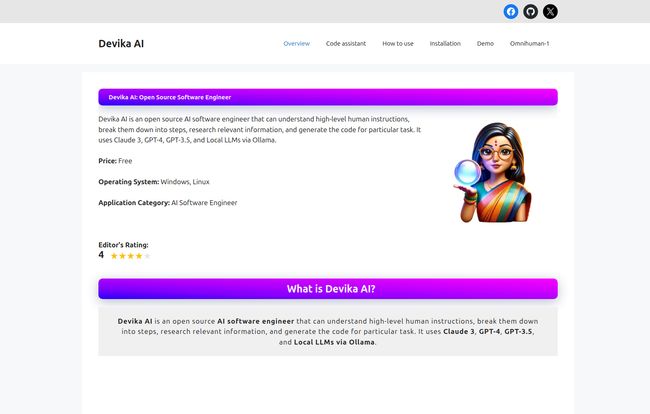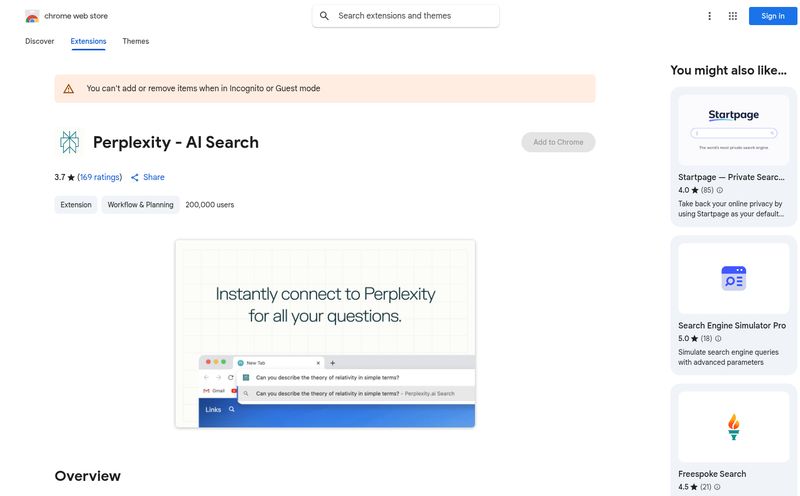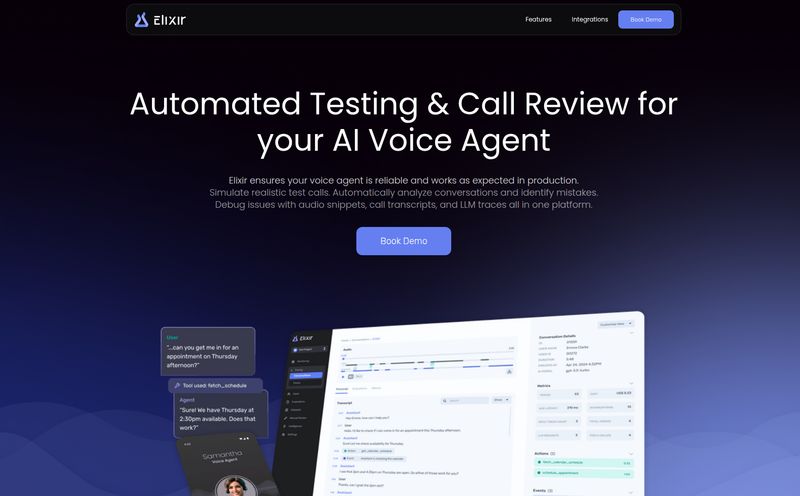The buzz around AI developers has been… a lot. A few months back, Devin AI exploded onto the scene, and you couldn't scroll through X or LinkedIn without seeing that mind-blowing demo. An AI that could take a task, plan it, browse for docs, and just… code the whole thing? It felt like the future had arrived, and it was a little bit terrifying and a whole lot of exciting.
But for many of us in the trenches, a big question mark hung in the air: it's cool, but it's a black box. A closed-source, waitlist-only product. The open-source community, true to form, responded with a resounding, "Hold my beer." And that's where I stumbled upon Devika AI. The name itself is a cheeky nod, isn't it? It immediately got my attention.
So I went looking. And my first interaction was, funnily enough, a 404 page on their supposed website. A perfect, almost poetic start for a tool that’s still finding its feet. But that’s the beauty of open source, right? The real action is on GitHub. And after spending some time digging into the code, spinning it up myself, and seeing what it can do, I've got some thoughts. Is Devika the grassroots, community-driven hero we need? Or is it another ambitious project that’s not quite ready for primetime? Let’s get into it.
So, What Exactly is Devika AI? It’s Not Another Copilot
First thing's first: you need to get the idea of a simple code assistant out of your head. We have GitHub Copilot, we have Codeium, and they are fantastic. They’re like having a super-smart pair programmer who can finish your sentences and suggest the next few lines of code. They’re assistants.
Devika is playing a different game entirely. It’s what we call an Agentic AI. Think of it less like a pair programmer and more like a junior project manager who can also code. You don’t give it line-by-line instructions. You give it a high-level objective. Something like:
Research the latest weather APIs and build a simple Python web app using Flask that shows the current temperature for a given city.
An assistant would help you write the Flask routes. Devika is designed to take that whole prompt, break it down into a plan, think, "Okay, first I need to find some weather APIs," then literally go browse the web, read documentation, decide on an API, and then start writing the code. It’s a fundamental shift from “helping you code” to “doing the coding for you.” It’s a big, audacious goal.

Visit Devika AI
The Core Features That Actually Matter
When you look at the feature list, it's easy for your eyes to glaze over. But a few things really stand out as the core of what makes Devika… well, Devika.
AI Planning and Web Research
This is the secret sauce. Before writing a single line of code, Devika creates a step-by-step plan. It reasons about the problem. If it doesn’t know something, its first instinct is to hit the web and find out. This ability to self-research is what separates it from simpler models. It mimics how a real human developer works. Stuck on a problem? You don't just stare at the screen; you open a new tab and start searching. Devika does the same.
Your Choice of Brains: Multi-LLM Support
This, for me, is a massive win. Devika isn't tied to one specific language model. You can plug in what works best for you. Want the power of GPT-4? Go for it. Prefer the speed and cost-effectiveness of Claude 3 Haiku? You can do that too.
Even better, it supports local models through Ollama. This is huge. If you've got a decent machine, you can run a model like Llama 3 or Mistral locally. This means no API costs, more privacy, and the ability to work completely offline (minus the web research part, obviously). That flexibility is a game-changer and a clear advantage of its open-source nature.
From Concept to Executable Code
Once the planning and research are done, Devika gets to work. It generates the code based on its plan, whether it's Python, JavaScript, or another language. The system tracks its own progress, showing you which step its on, what it’s thinking, and what code it's producing. It's like watching a developer work in fast-forward.
Getting Your Hands Dirty: The Devika Setup
Okay, so this isn't a simple app store download. You're going to have to roll up your sleeves and get comfy with the command line. The installation involves cloning the GitHub repository, setting up a Python environment, and installing a list of dependencies. If you've ever set up an open-source project, it’s pretty standard stuff.
The main hurdle for many will be configuring the .env file. This is where you plug in your API keys for services like OpenAI or Anthropic. So while Devika itself is free, using the most powerful models will still cost you money via API calls. It's an important distinction to make. The software is free, but the "brains" might not be.
Devika vs. Devin: The Open-Source Showdown
It's the comparison everyone is going to make, so let's just put it on the table. How does the community's champion stack up against the Silicon Valley star?
| Aspect | Devika AI | Devin AI |
|---|---|---|
| Cost | Free (potential API costs) | Paid (pricing not public) |
| Accessibility | Open Source (Code on GitHub) | Closed Source (Waitlist) |
| Model Flexibility | High (Supports GPT, Claude, local LLMs) | Unknown (Proprietary) |
| Maturity | Early Development (Expect bugs) | Polished Product (Likely more stable) |
They are two very different beasts built on a similar philosophy. Devin is a polished car you can hopefully buy one day. Devika is the engine and a box of parts that you can build, modify, and improve yourself.
The Good, The Bad, and The Buggy
After playing with it, I've formed some strong opinions. The best part of Devika is its promise and its spirit. It represents the democratization of this powerful agentic technology. The fact that any developer can download it, tinker with it, and even contribute back is incredibly powerful. The potential here is just immense.
But let's be real. It is early. The "cons" listed in the project's own documentation are honest and accurate. You will encounter bugs. Some features might not work as expected. It can get stuck in loops or produce code that doesn't quite run. You have to go into it with the mindset of an explorer and a beta tester, not a consumer expecting a flawless product. Its not a fire-and-forget tool just yet; it often requires a bit of hand-holding and iteration.
So, Should You Try Devika AI?
My verdict? A resounding yes, but with a big asterisk.
You should absolutely try Devika if:
- You're a developer or hobbyist curious about the future of agentic AI.
- You love open-source and want to see what the community is building.
- You have some patience and enjoy tinkering with cutting-edge (and sometimes broken) tech.
- You want to run an AI developer agent on your own hardware using local models.
You might want to wait if:
- You're looking for a 100% reliable tool to use on a critical production project today.
- You're not comfortable with the command line or setting up API keys.
- You expect a completely polished, seamless user experience out of the box.
Devika AI is a fascinating, important, and promising project. It’s a snapshot of where we are on the road to truly autonomous AI software engineers. It’s a bit messy, a bit buggy, but it’s ours—the community’s. And for that reason alone, it's worth your attention.
Frequently Asked Questions
Is Devika AI completely free to use?
Yes, the Devika software itself is open-source and free. However, to use its full capabilities, you'll need to connect it to a Large Language Model (LLM). If you use a commercial model like GPT-4 or Claude 3, you will incur API costs from those providers. You can avoid this by using a free, locally run model via Ollama.
Is Devika AI a replacement for human developers?
Not even close, at least not right now. It's a powerful tool and a glimpse into the future, but it requires significant human oversight, guidance, and debugging. Think of it as an extremely capable intern, not a senior developer.
What programming skills do I need to install Devika?
You should be comfortable with using the command line, using Git to clone a repository, and running Python scripts. The installation guide is clear, but it assumes a baseline level of technical knowledge.
How does Devika AI compare to Devin AI?
Devika is the open-source, community-driven alternative to the closed-source, commercially-focused Devin. Devika offers more flexibility in terms of which AI models you can use, while Devin is likely a more polished and currently more capable product. The biggest difference is philosophy: open and customizable vs. closed and productized.
Can I contribute to the Devika project?
Absolutely! As an open-source project, contributions are highly encouraged. You can find the project on GitHub, where you can report issues, suggest features, or even submit your own code to improve it.
Can Devika AI run without an internet connection?
Yes, it can run in a limited capacity. If you configure it to use a local LLM through Ollama, the core planning and code generation can happen offline. However, one of its key features—the ability to browse the web for research—will naturally not work without an internet connection.
Reference and Sources
- Official GitHub Repository: stitionai/devika
- Local LLM Runner: Ollama



